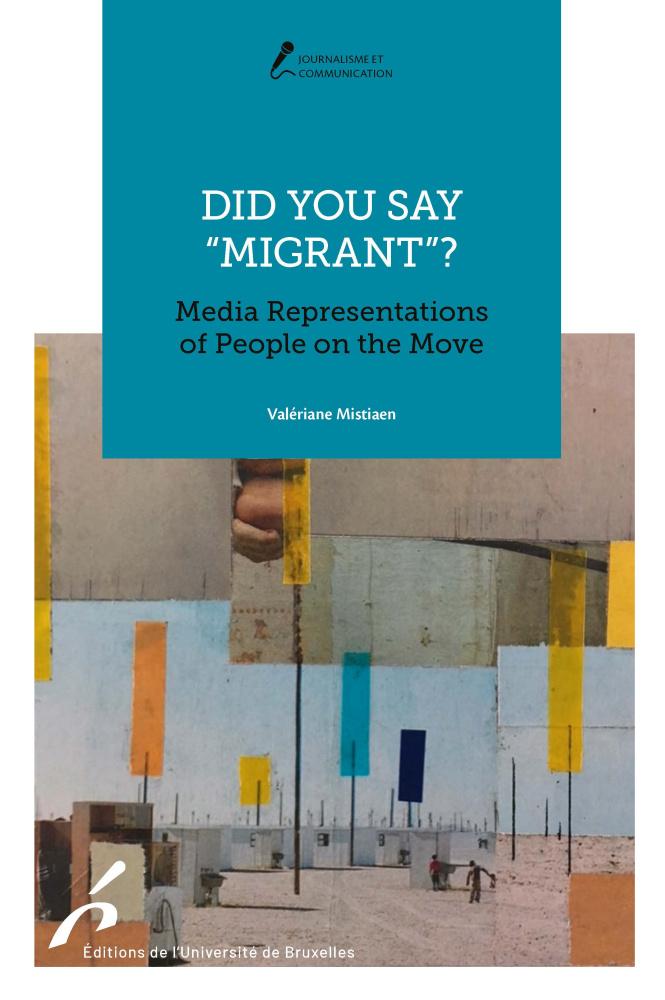- Faculté de Lettres, Traduction et Communication
- Accueil
- Publications en Sciences de l'Information et de la Communication
-
Partager cette page
Did you say "migrant"?
Media Representations of People on the Move
The 2011 war in Syria triggered a wave of people seeking asylum in Europe, bringing immigration into the political and media spotlight and sparking numerous debates on displaced people. Valériane Mistiaen's lbook contributes to the understanding of how language shapes social debates and is an essential resource for anyone interested in the multilingual analysis of media texts.
Mistiaen Valériane, Éditions de l'Université de Bruxelles, coll. Journalisme et Communication, juillet 2025

The 2011 war in Syria triggered a wave of people seeking asylum in Europe, bringing immigration into the political and media spotlight and sparking numerous debates on displaced people. These debates have been marked by a heightened focus on the terminology used to describe people on the move.
Terms such as refugee, migrant, immigrant, asylum seeker, illegal immigrant, and displaced person have circulated in the media, often blurring our understanding of events or conveying contradictory representations of those involved. Moreover, the words used to define people on the move are not fixed in time; their meaning and reference emerge from events and social representations, shaping both the public issue of migration and the image of the social actors concerned.
Using a discursive approach that combines discourse analysis and corpus linguistics, this book examines how the Belgian media referred to displaced people. It is innovative in three key ways. Firstly, it analyses media coverage in both the French- and Dutch-speaking communities of Belgium, allowing for comparisons of how migration was represented in two culturally, linguistically, and politically distinct regions of the same country. Secondly, it studies both written and audiovisual media, drawing on an extensive dataset of 13,391 press articles and 3,490 television news items. Finally, it goes beyond the most commonly used terms related to migration, exploring a significantly broader range of designations than have previously been studied.
This book contributes to the understanding of how language shapes social debates and is an essential resource for anyone interested in the multilingual analysis of media texts.
Valériane Mistiaen is a FWO post-doc researcher at VUB-Vrije Universiteit Brussel. She holds a PhD in Information and Communication (ULB-Université libre de Bruxelles) and in Communication and Media Studies (VUB). Her PhD research combines Discourse Analysis with Corpus Linguistics to study how denominations used to name people on the move in Belgian French- and Dutch-language media build the public issue of migration differently in both linguistic communities of Belgium. Her current research focusses on how grammatical morphology carries ideology in state-induced return discourse related to migration. This research is carried in French, Dutch, Spanish and English. She was also a researcher involved in the IM2MEDIATE project (funded by Belspo) studying the representation of migrants in Belgian and Swedish media. She is a member of the Centre for the study of Democracy, Signification and Resistance (DESIRE – VUB), the ECHO Media, Culture and Politics (VUB), the research centre in Migrations, Asylum & Multiculturality (MAM – ULB) and the Centre for Research in Information and Communication Sciences (ReSIC – ULB).
- Cet ouvrage est disponible sur le site des Éditions de l'Université de Bruxelles
Did you say "migrant"? est le septième ouvrage de la collection Journalisme et Communication, rattachée au centre de recherche en information et communication ReSIC. Cette collection veut promouvoir l’analyse de la diversité, des hybridations entre domaines de la communication et de l’information, de la pluralité de producteurs et récepteurs actifs qui défient les catégories préétablies. La communication, les médias et le journalisme sont des sphères professionnelles au coeur des sociétés contemporaines. Leur rôle pour donner du sens à nos vies individuelles et collectives est traversé par des évolutions contradictoires, notamment dans le contexte d'une numérisation qui mérite d’être abordée avec un regard critique, comme phénomène socio-culturel inscrit dans des pratiques et représentations multiples.
Dans la presse
Valériane Mistiaen, « "Migrants", "réfugiés", "illégaux", "candidats à l'asile"... comment les politiques et les médias désignent les personnes en déplacement »,The Conversation, 10/07/2025
Lire l'article
